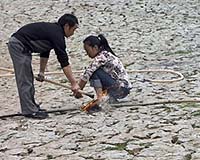 |
Bordeaux, France (AFP) Feb 8, 2011 Bordeaux's fabled wine grapes are under threat from global warming, climate experts told a meeting of industry leaders Tuesday. "The pessimistic scenario shows that Bordeaux's climate, by 2050, will no longer favour Cabernet and Merlot," the backbone varietals of the region's red wines, said Jean-Pascal Goutouly, a researcher at the National Institute for Agricultural research (INRA). "We are currently on the most pessimistic curve -- that's the emergency," he told winemakers from some of the region's most prestigious chateaux. For Bordeaux, climate change means higher minimal temperatures and drought during the summer, the conference heard. The first means that grapes ripen earlier, and the second that vines are more likely to lack water at a critical stage of maturation. The result is that aromas lose their freshness, and the wines lack the delicate balance of acidity, sugar and tannins that allow them to age gracefully -- and fetch huge prices at market. Despite the bad news, winegrowers remained optimistic about their ability to overcome the challenges confronting them. "If climate change comes quickly, it will be difficult. If it comes slowly, we will adapt," said Philippe Bardet, a winegrower on the council's technical committee. "We survived phylloxera, which wiped out every vine in five years. We will adapt to climate change." In the late 19th century an epidemic of the aphid-like pest phylloxera destroyed most of Europe's vineyards, especially in France. Grape growers began to notice unusual patterns above-and-beyond the region's fickle weather nearly three decades ago, well before scientists began to sound the climate change alarm. "We've seen climate warming since the 1980's with the date of the harvest coming earlier, but now it seems to have stabilized," said Bardet. "The average temperature is lower. But experts say it could start rising again." Goutouly held up the 2003 heat wave -- when temperatures frequently topped 40 degrees Celsius (104 degrees Fahrenheit) -- as an example of what Bordeaux can expect on a more frequent basis by century's end. "In 2003, the vineyards that produce Lafite had a classic, typical reaction," producing stellar bottles, said Charles Chevalier, technical director and winemaker at the fabled chateau. "But lesser terroirs were more sensitive -- those grapes had higher sugar levels." The consulting oenologist at another renowned estate admitted that some plots "didn't do well at all" in coping with the extreme conditions. Already the winegrowers have begun adapting, turning to clones -- slight variations within a varietal -- that had been set aside in the past because they ripened too late, and looking at rootstock that will deliver water during a drought.
Share This Article With Planet Earth
Related Links Farming Today - Suppliers and Technology
 Drought threatens China crops, UN Food agency warns
Drought threatens China crops, UN Food agency warnsRome (AFP) Feb 8, 2011 A severe winter drought is threatening crop production in China, the world's biggest wheat provider, the UN's Food and Agriculture Organisation (FAO) said in an alert issued Tuesday. Substantially below-normal rainfall since October in Northern China has not only put the crop at risk but has also caused shortages in drinking water affecting over 2.57 million people and their livestock, FAO s ... read more |
|
| The content herein, unless otherwise known to be public domain, are Copyright 1995-2010 - SpaceDaily. AFP and UPI Wire Stories are copyright Agence France-Presse and United Press International. ESA Portal Reports are copyright European Space Agency. All NASA sourced material is public domain. Additional copyrights may apply in whole or part to other bona fide parties. Advertising does not imply endorsement,agreement or approval of any opinions, statements or information provided by SpaceDaily on any Web page published or hosted by SpaceDaily. Privacy Statement |